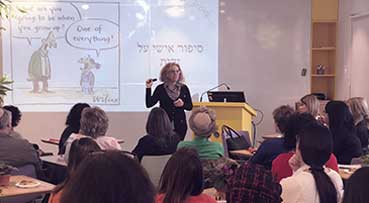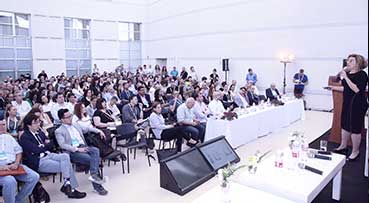The dawn of a new academic year often brings with it fresh
backpacks, shiny pencils, and the tingling anticipation of new learnings. But
this year, there’s an added dimension—the pulsing undercurrent of Artificial
Intelligence (AI) that’s not just reshaping industries but also homes. As the world gears up for another era dominated
by digital innovations, there’s a profound, often overlooked, opportunity for parents
and children to navigate these waters collectively as a family.
We’re amidst a revolution that values skills and
adaptability over age. The hierarchical model of learning, where knowledge
flows from the old to the young, is becoming obsolete. The world of AI is
further strengthening a paradigm where age isn’t necessarily an advantage. Remarkably,
children and adults often discover they’re on parallel learning trajectories,
paving the way for intergenerational learning. In this dynamic, roles fluidly
interchange and the teacher becomes the student. Whether you’re 40 or 14, AI
has something to offer and to learn from. Compound this with the reality that
homes are evolving into workplace hubs, and you unearth opportunities for kids
to witness, assimilate, and even contribute to their parents’ professional
world and vice versa. This mutual sharing can foster a deeper understanding of
digital tools and collaborative platforms for parents and children alike.
AI can transition from being perceived as a daunting
challenge to an inviting opportunity, from an intimidating monolith to a
collaborative tool bringing generations together. Every error, every line of
code, and every AI-powered game becomes a building block for nurturing
resilience, adaptability, and an insatiable thirst for knowledge. As the
tech-driven world accelerates, there’s unmatched value in the life experiences,
ethics, and morals of the older generation. Parents, while adapting to new
tools and technologies, can instill these timeless principles in their kids.
This ensures a harmonious blend of progress and tradition, fostering dual
growth for both parent and child.
AI as a Family Quest
Gone are the days when elders impart wisdom to the younger
generation in a one-way flow. In the contemporary AI-saturated world, the
transmission of knowledge has become a two-way street, and it’s high time we
recognize and adapt to this shift. Children, often the tech enthusiasts, bring
to the table raw curiosity. Parents, with life experiences, offer strategic
perspectives. When combined, this duo can decode AI’s intricacies, harness its
powers, and translate them into real-world applications.
Here’s a proposition: why not divvy up the charge of
scouting and introducing fresh AI tools? This not only shares the
responsibility but also the exhilaration of unearthing the latest in AI innovations.
It’s a journey where each member becomes conscious of their learning patterns,
preferred resources, effective time allocation, and optimal platforms and tools
selection.
To maintain momentum in this ceaseless learning expedition,
families can delegate tasks. Hunt for enlightening online courses, earmark
go-to sources on platforms like Twitter or LinkedIn, subscribe to newsletters,
or become avid followers of AI visionaries. Enroll in seminars, dabble in DIY
AI ventures, or set up monthly family “tech talks”. As technology progresses at
breakneck speeds, underscore the essence of continuous learning and iterative
skill enhancement. Families can curate a shared learning calendar, jointly attending
online tutorials or seminars. Construct shared goals; perhaps it’s a rotation
system where a different member showcases a new AI tool at supper, or a
dedicated weekly family hour to understand and discuss AI trends.
At its core, this initiative isn’t just about mastering AI.
It’s an exploration into the art of learning itself – discerning individual
learning tempos, recognizing personalized learning tools, and cherishing
moments of collaborative study and dialogue about newfound insights.
From Homeroom to Boardroom
Children today aren’t just digital natives; they’re also
intuitive explorers of this vast digital domain. For families willing to
consciously weave AI into their daily tapestry, the rewards are multifaceted.
Such an integration not only endorses the ethos of constant learning for
children but also sows the seeds of a resilient growth mindset in adults—a
competency equally pivotal in playgrounds and boardrooms.
It’s often said that learning comprises 10% formal
education, 20% peer interactions, and a whopping 70% through hands-on
experiences. This also holds true in our AI journey too. After you’ve
discovered a new tool or prompt to way to use AI, learning will only really
happen if you put it to use. It’s imperative, then, to engage the entire family
into this AI journey through real life activities. Consider the students in the
family. What if their standard homework sessions metamorphosed into AI-Assisted
Homework? Instead of condemning such practices as mere shortcuts, envision them
as a learning exercise. Here, the goal is twofold: gain hands on experience
with AI tools while also honing the invaluable art of critical thinking,
validation, and authentic content creation.
But why stop at homework? Redefine Family Time and ask
yourself if you can integrate AI into day-to-day activities. Contemplating a
vacation? Navigate platforms like Roam
Around to tailor your itinerary to your preferences. Hosting a dinner with
friends? Try AI platforms like dishgen and
toss up search prompts like “Easy whole-wheat blueberry muffins that I can make
in 30 minutes”. Feeling the creative itch? Dive headfirst into the latest and
greatest of AI-assisted multimedia creation and editing. And don’t look for
another link for a specific tool recommendation. The digital landscape is so
dynamic, it’s likely that by the time you’re reading this, a slew of newer,
shinier platforms have emerged. So, embark on that discovery quest and pinpoint
what aligns best with your aspirations.
The Emotional Component
While AI might seem like a purely technological frontier,
it’s imbued with layers of emotion, ethical considerations, and profound
philosophical questions. Each member of the family, irrespective of their age
or technological prowess, brings a unique lens to the AI conversation—a blend
of personal experiences, worldviews, and inherent wisdom. Embarking on a
collective AI journey doesn’t just enrich the mind; it nurtures the heart.
When families decide to explore AI’s depths together,
they’re essentially stitching a rich tapestry of shared ambitions, trials,
tribulations, and eureka moments. It’s this intricate mosaic of shared experiences
that lays the bedrock for deep-seated understanding, mutual respect, and
heightened empathy. Imagine a teenager navigating a perplexing algorithm,
mirroring the struggles a parent might face while configuring a virtual
assistant. These parallel journeys, though distinct, echo the universal
challenges of acclimating to an increasingly digital age. Through such common
endeavours, generations come to realize the ubiquity of challenges and the
unity in overcoming them.
Yet, it’s not just about the victories. The world of AI,
rife with its unpredictable outputs and quirks, mirrors life’s uncertainties.
Not every code will compile seamlessly; not every attempt will yield the
anticipated outcome. But herein lies the silver lining—a lesson in resilience,
and the age-old wisdom that that failure is just a stepping stone to success.
It’s an invaluable life lesson wrapped in the garb of tech education: the
spirit of perseverance, the embrace of continuous evolution, and the unwavering
belief that growth is an ongoing journey, unbound by age or era.
As the pace of technological evolution continues to surge,
AI developments might seem to pop up faster than we can keep up. But what if we
viewed each new tool, every innovative capability not as another item on the to-learn
list, but as an invitation? An invitation to join hands with the younger
generation, explore, innovate, and most importantly, bond.
The transformation sweeping across industries, instigated by AI, is profound. Yet, at the very core, it offers families a unique opportunity to co-create with your kids while at the same time learning together the skills you need for the workforce of tomorrow. Beyond the codes, algorithms, and digital interfaces, lies an even more significant realization: the AI revolution isn’t just about technology—it’s also about people. As parents and children embark on this shared learning journey, they don’t merely acquire skills; they build memories, understanding, and mutual respect. In navigating the AI landscape together, families can discover that the heart of technology is, after all, very human.

![large-AX1A2125-2[1]](https://niritcohen.com/wp-content/uploads/elementor/thumbs/large-AX1A2125-21-pnzedcs72atx5aeurqytqdiihxixlq02re9mlz805s.jpg)






